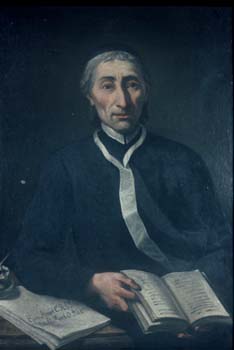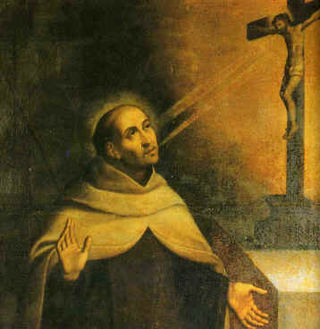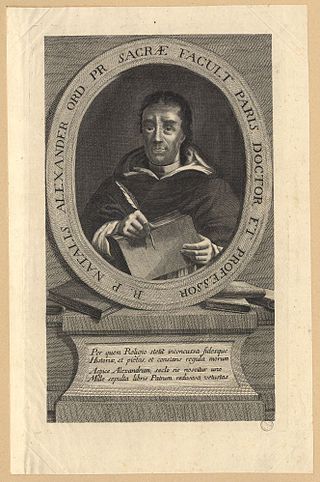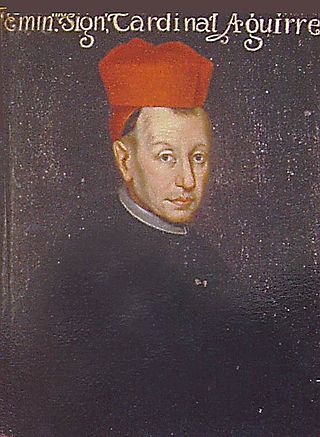Related Research Articles

Eusebius Amort was a German Roman Catholic theologian.

John of the Cross, OCD was a Spanish Catholic priest, mystic, and a Carmelite friar of converso origin. He is a major figure of the Counter-Reformation in Spain, and he is one of the thirty-seven Doctors of the Church.

Luis de León, was a Spanish lyric poet, Augustinian friar, theologian and academic, active during the Spanish Golden Age.

Juan Caramuel y Lobkowitz was a Spanish Catholic scholastic philosopher, ecclesiastic, mathematician and writer. He is believed to be a great-grandson of Jan Popel y Lobkowicz.

Noël Alexandre, or Natalis Alexander in Latin was a French theologian, author, and ecclesiastical historian.

John Major was a Scottish philosopher, theologian, and historian who was much admired in his day and was an acknowledged influence on all the great thinkers of the time. A renowned teacher, his works were much collected and frequently republished across Europe. His "sane conservatism" and his sceptical, logical approach to the study of texts such as Aristotle or the Bible were less prized in the subsequent age of humanism, when a more committed and linguistic/literary approach prevailed.

Joseph Sáenz de Aguirre, OSB was a Cardinal, and learned Spanish Benedictine.

Tirso González de Santalla was a Spanish theologian who was elected, in 1687, the thirteenth Superior General of the Society of Jesus.

Lope de Barrientos (1382–1469), sometimes called Obispo Barrientos, was a powerful clergyman and statesman of the Crown of Castile during the 15th century, although his prominence and the influence he wielded during his lifetime is not a subject of common study in Spanish history.

John de Lugo (1583–1660), a Spanish Jesuit and Cardinal, was an eminent theologian of the Baroque.

Francisco de Lugo (1580–1652) was a Spanish Jesuit theologian. He briefly taught theology at the Universidad Javeriana in Santa Fe de Bogota, New Kingdom of Granada before moving to Mexico. During his time in America, he wrote several works which were published upon his return to Spain.
Vincent Baron was a French Dominican theologian and preacher.
Salmanticenses and Complutenses are the Latin names designating the Spanish Catholic authors of the courses of Scholastic philosophy and theology, and of moral theology published by the lecturers of the philosophical college of the Discalced Carmelites at Alcalá de Henares, and of the theological college at Salamanca.
Juan Maldonado was a Spanish Jesuit theologian and exegete.

Guillaume Herincx, was a Belgian Franciscan theologian. He became bishop of Ypres.
Juan Bautista de Lezana was a Spanish Carmelite theologian. Lezana was an authority on canon law, dogmatic theology, and philosophy; his historical works are not of the same standard.
Catholic dogmatic theology can be defined as "a special branch of theology, the object of which is to present a scientific and connected view of the accepted doctrines of the Christian faith."

Théophile Raynaud was a French Jesuit theologian and writer.

Francisco of Osuna, O.F.M., was a Spanish Franciscan friar and author of some of the most influential works on spirituality in Spain in the 16th century.

Jean-Baptiste Du Hamel, Duhamel or du Hamel was a French cleric and natural philosopher of the late seventeenth century, and the first secretary of the Academie Royale des Sciences. As its first secretary, he influenced the initial work of the Académie, but his legacy and influence on the Académie and the growth of science in France is mixed.
References
- 1 2 3 Louis Moreri and Jean Le Clerc. Le Grand dictionnaire Historique sur le Mélange Curieux de l'Histoire Sacée et Profane, volume 2, p267.
- 1 2 John McClintock. Cyclopaedia of Biblical, Theological, and Ecclesiastical Literature, volume 12, p114.
- ↑ Sanchez d'Avila. Vita Actoris, in Pedro Cornejo Theologia Scholastica et Moralis.
- ↑ Jean-Yves Lacoste. Encyclopedia of Christian Theology, volume 1, p260.
- ↑ Melquíades Andrés and Melquíades Andrés Martín. La teología española en el siglo XVI, volume 1, p162.